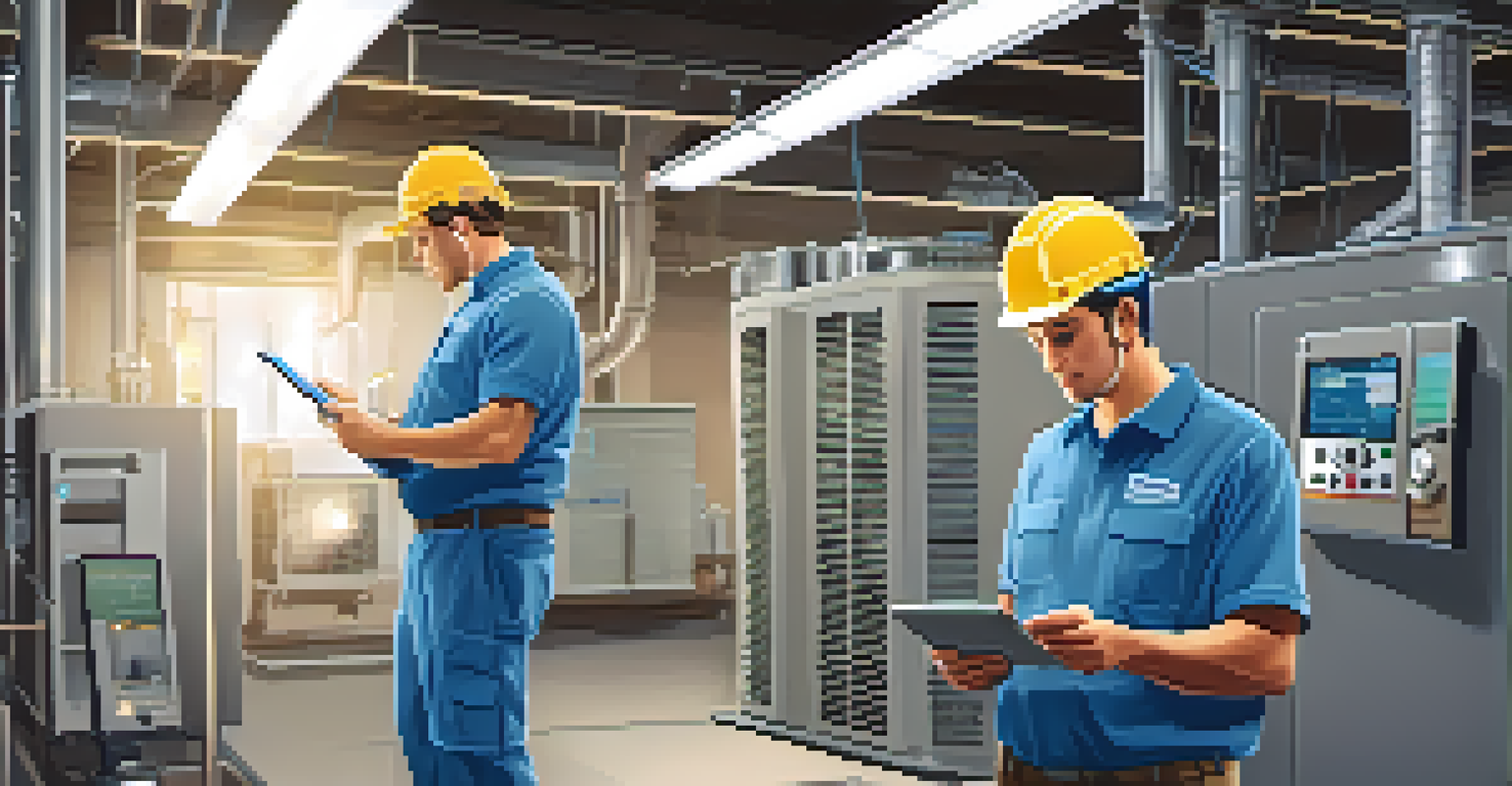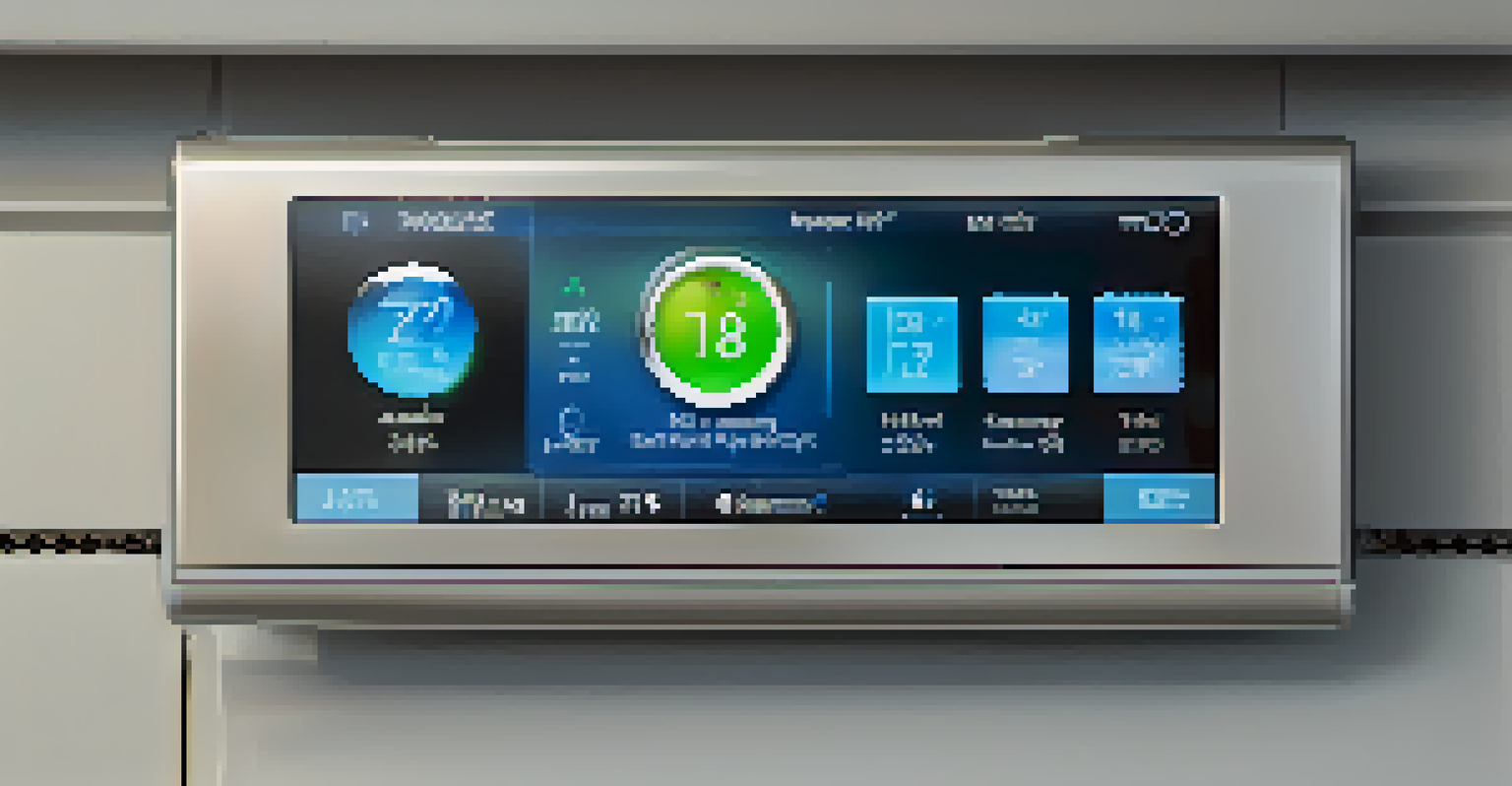Implementing Energy-Efficient HVAC Systems in Buildings

Understanding the Importance of Energy-Efficient HVAC Systems
Energy-efficient HVAC systems are crucial for reducing energy consumption in buildings. These systems not only lower utility bills but also minimize the environmental impact of heating and cooling. With climate change becoming a pressing issue, adopting energy-efficient practices is more important than ever.
Energy efficiency is not just a goal; it is a way of life that can lead to healthier environments and significant cost savings.
By investing in these systems, building owners can enhance comfort while also contributing to sustainability. For instance, a well-designed HVAC system can significantly cut greenhouse gas emissions, showcasing a commitment to environmental responsibility. This is particularly relevant as more consumers prioritize eco-friendly options.
Moreover, energy-efficient HVAC systems often have longer lifespans and require less maintenance. This translates to fewer disruptions and lower overall costs in the long run, making it a smart investment for both residential and commercial properties.
Evaluating Current HVAC Systems: A First Step
Before implementing energy-efficient systems, it's essential to assess the current HVAC setup. This evaluation helps identify inefficiencies and potential areas for improvement. For instance, older systems may not only consume more energy but may also struggle to maintain consistent indoor temperatures.

Conducting an energy audit can reveal how much energy the existing HVAC system uses and where it can be enhanced. By pinpointing specific issues, building owners can create a tailored plan that addresses inefficiencies. It’s like taking a health check-up for your building’s climate control system.
Energy Efficiency Reduces Costs
Investing in energy-efficient HVAC systems lowers utility bills and minimizes environmental impact.
Once the evaluation is complete, owners can prioritize upgrades based on the potential energy savings. This systematic approach ensures that investments are made where they will have the most significant impact, streamlining the process of modernization.
Choosing the Right Energy-Efficient HVAC System
Selecting the right energy-efficient HVAC system involves understanding the different technologies available. Options like variable refrigerant flow (VRF) systems or geothermal heat pumps offer significant energy savings compared to traditional units. Each system has its pros and cons, so it's essential to consider the specific needs of the building.
The best way to predict the future is to create it.
For example, VRF systems are great for buildings with varying heating and cooling demands. They allow for precise temperature control in different zones, enhancing comfort and efficiency. Meanwhile, geothermal systems utilize the earth's stable temperature, providing an efficient solution for both heating and cooling.
It's also vital to consider the size of the system in relation to the building. An oversized unit can lead to inefficiencies and increased wear and tear, while an undersized unit may struggle to maintain comfort levels. Consulting with HVAC professionals will help ensure the right fit for your specific situation.
Incorporating Smart Technology in HVAC Systems
Smart technology is revolutionizing HVAC systems, making them more energy-efficient and user-friendly. Features like programmable thermostats and smart sensors allow for precise control over heating and cooling, adapting to occupancy patterns. This means energy isn’t wasted when spaces are unoccupied.
For instance, a smart thermostat can learn your habits and adjust settings accordingly. If you leave for work at 8 AM, it can lower the temperature, then warm the house just before you return. This proactive approach not only enhances comfort but also significantly reduces energy costs.
Regular Maintenance Ensures Efficiency
Routine maintenance is essential for maintaining peak performance and prolonging the lifespan of HVAC systems.
Integrating these technologies requires an upfront investment, but the long-term savings often outweigh the initial costs. As technology advances, staying updated with improvements can further optimize energy use and maintain efficiency over time.
Enhancing Insulation for Maximum Efficiency
While HVAC systems are crucial, the effectiveness of energy-efficient solutions heavily relies on proper insulation. Insulation acts as a barrier, helping to maintain indoor temperatures and reducing the workload on HVAC systems. Without adequate insulation, even the best systems can struggle to keep up.
Consider this: if your home is poorly insulated, it’s like trying to fill a bucket with holes. No matter how much energy-efficient technology you implement, you’ll still lose energy. Therefore, ensuring that walls, roofs, and floors are well-insulated is a fundamental step in the process.
Upgrading insulation not only aids in energy efficiency but also enhances indoor comfort. With a well-insulated building, occupants can enjoy a more stable temperature year-round, contributing to a better living or working environment.
Regular Maintenance: Key to Sustained Efficiency
Implementing an energy-efficient HVAC system isn’t a one-and-done deal; regular maintenance is essential for long-term performance. Routine checks can identify issues early, ensuring that systems operate at peak efficiency. This includes tasks like changing filters, cleaning coils, and checking for leaks.
Just like a car needs regular oil changes to run smoothly, HVAC systems require regular attention. Neglecting maintenance can lead to decreased efficiency and higher energy bills, negating the benefits of the initial investment. Scheduling seasonal check-ups can prolong the lifespan of the system.
Smart Tech Enhances HVAC Performance
Incorporating smart technology in HVAC systems allows for precise control and significant energy savings.
Additionally, many HVAC service providers offer maintenance plans, making it easier to stay on top of necessary tasks. This proactive approach not only saves money in the long run but also ensures a comfortable environment throughout the year.
The Future of Energy-Efficient HVAC Systems
As technology continues to evolve, the future of energy-efficient HVAC systems looks promising. Innovations such as advanced heat recovery systems and AI-driven analytics are on the horizon. These developments aim to further enhance efficiency and user experience, making energy management even smarter.
For instance, AI can analyze usage patterns and automatically adjust settings for optimal performance. This means systems can learn and adapt in real-time, providing comfort while minimizing energy use. It’s like having a personal assistant for your building's climate control.

Moreover, with increasing awareness of climate issues, there’s a push for stricter regulations and incentives for energy-efficient upgrades. This means building owners have more resources and motivation to invest in these systems, paving the way for a greener future.